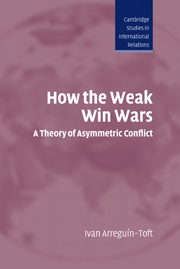Book contents
- Frontmatter
- Contents
- List of figures
- Preface
- Acknowledgments
- List of abbreviations
- 1 Introduction
- 2 Explaining asymmetric conflict outcomes
- 3 Russia in the Caucasus: the Murid War, 1830–1859
- 4 Britain in Orange Free State and Transvaal: the South African War, 1899–1902
- 5 Italy in Ethiopia: the Italo-Ethiopian War, 1935–1940
- 6 The United States in Vietnam: the Vietnam War, 1965–1973
- 7 The USSR in Afghanistan: the Afghan Civil War, 1979–1989
- 8 Conclusion
- Appendix
- References
- Index
- CAMBRIDGE STUDIES IN INTERNATIONAL RELATIONS
8 - Conclusion
Published online by Cambridge University Press: 22 August 2009
- Frontmatter
- Contents
- List of figures
- Preface
- Acknowledgments
- List of abbreviations
- 1 Introduction
- 2 Explaining asymmetric conflict outcomes
- 3 Russia in the Caucasus: the Murid War, 1830–1859
- 4 Britain in Orange Free State and Transvaal: the South African War, 1899–1902
- 5 Italy in Ethiopia: the Italo-Ethiopian War, 1935–1940
- 6 The United States in Vietnam: the Vietnam War, 1965–1973
- 7 The USSR in Afghanistan: the Afghan Civil War, 1979–1989
- 8 Conclusion
- Appendix
- References
- Index
- CAMBRIDGE STUDIES IN INTERNATIONAL RELATIONS
Summary
The vast majority of wars do not come into the heavyweight range, but are distinguished more by their duration and bitterness than their weaponry. In a way they become more amenable to Western intervention when they do develop into straightforward clashes between regular forces. Civil wars, involving irregular fighters and skirmishes in the streets, with political confusion rife and good intelligence at a premium, present an appalling prospect to outsiders. Decisive victories are few and far between. Even success can mean a long-term commitment of troops to sustain an uneasy peace.
FreedmanThis book began with a puzzle. How do the weak win wars? Through a combination of statistical tests and the tracing of causal logic through historical case studies, I have shown that weak actors – in this case mainly states – win wars against much stronger adversaries when they are able to adopt and maintain an ideal counterstrategy. Strategy, in other words, can multiply or divide applied power.
Strong actors come to a fight with a complex combination of interests, forces, doctrine, military technology, and political objectives, but because armed forces are thought to be versatile in their employment, and because strong actors are only relatively, not absolutely, strong, strong actors do have choices in the strategies they use. Similarly, weak actors often face constraints in their choice of strategies, but strategy is never endogenous.
- Type
- Chapter
- Information
- How the Weak Win WarsA Theory of Asymmetric Conflict, pp. 200 - 227Publisher: Cambridge University PressPrint publication year: 2005



